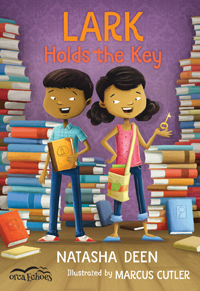| ________________
CM . . .
. Volume XXIII Number 1. . . .September 9, 2016

 |
Lark Holds the Key. (Orca Echoes).
Natasha Deen. Illustrated by Marcus Cutler.
Victoria, BC: Orca Books, 2016.
74 pp., pbk., pdf & epub., $6.95 (pbk.).
ISBN 978-1-4598-0727-3 (pbk.), ISBN 978-1-4598-1129-4 (pdf), ISBN 978-1-4598-1130-0 (epub).
Grades 2-4 / Ages 7-9.
Review by Janice Foster.
**** /4
Reviewed from Advance Reading Copy.
|
| |
|

excerpt:
My name is Lark Ba, and I have ants in my pants. Not really. That would be gross. And not so much fun for the ants. Ants in my pants means it’s hard for me to sit quietly. It’s something my halmoni – that’s Korean for grandmother – says when I’m really exsited exceted excited.
From the opening introduction of Lark Ba, aspiring detective, young readers embark on a humourous, entertaining adventure. It’s the third day of summer vacation. Lark and her twin brother, Connor, head off to the library with their mother and Halmoni (grandmother). They discover that the library is locked and that the librarian has lost the key. Lark, who was looking forward to getting books on detectives, realizes that she now has a real case. Together, the twins set out to solve the mystery and locate the missing key.
Lark Holds the Key is an “Orca Echoes” short chapter book for younger readers that is useful for programs focusing on social responsibilities and character building. Award-winning author Natasha Deen skillfully blends social and development issues into an engaging story. The readers learn that Halmoni is the twins’ Korean grandmother and that their grandfather Babu is Kenyan. They also see how Lark handles a situation when a classmate, Sophie, makes fun of her name, calling her “Baa baa Lark sheep”. Connor is upset, telling Sophie that “That’s not cool.” Young readers might find Lark’s initial reaction surprising, but, as the story proceeds, they gather some insight into friendship building. When Lark is reading the recipe for French toast out loud, her grandmother reminds her to get out her special paper. Lark explains that she has dyslexia and provides a clear, simple definition as well as information on how she deals with it. These issues are cleverly woven into the story.
The narrative style of Lark Holds the Key has a distinctively personal flavour with the inclusion of crossed out spelling attempts. Lark’s fascination with words enhances the text and adds humour. Explanations of some of the words she forgets as well as some idioms that might puzzle younger readers are provided at the end of the book so that thy can go back and revisit the specified sections. Lark’s narrative voice gives the audience a clear picture of her character. Although her use of “bestest” and “worstest” is typical of children, the inclusion of “plus”, “pluser” and “plusest” is awkward and not clear on first reading. Each chapter includes a full and/or half page illustration. These amusing black and white drawings by Marcus Cutler enhance the text and add appeal for both young and reluctant readers.
Lark Holds the Key provides an excellent example of the steps of problem solving. Mapping out how Connor and Lark solve the mystery might be a follow-up activity that could be used with other mystery novels. After reading this first book in the Lark Ba detective series, young readers will look forward to the sequel.
Highly Recommended.
Janice Foster is a retired teacher and teacher-librarian in Winnipeg, MB.

To comment
on this title or this review, send mail to cm@umanitoba.ca.
Copyright © the Manitoba Library Association. Reproduction for personal
use is permitted only if this copyright notice is maintained. Any
other reproduction is prohibited without permission.
Next Review | Table of Contents For This Issue - September 9, 2016
CM Home | Back Issues
| Search
| CM Archive
| Profiles Archive
|
